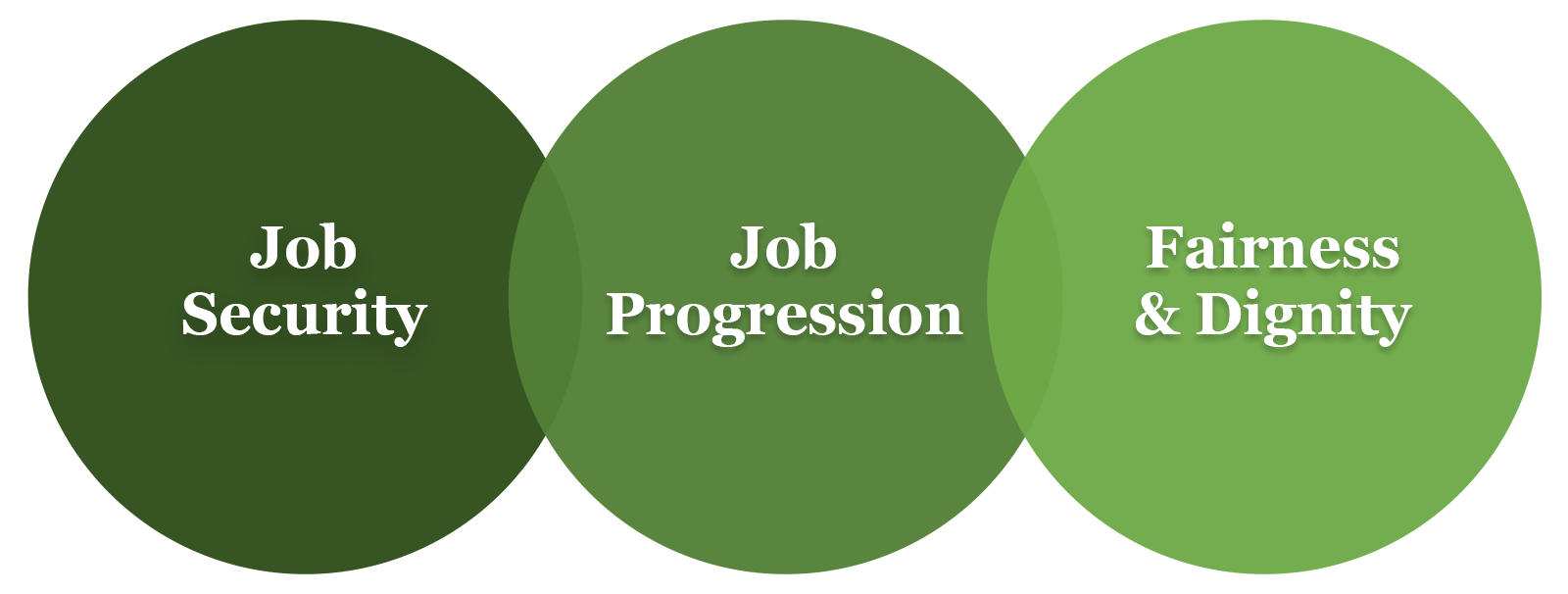Our Bargaining Mandate
The Bargaining Process
and where we're at right now
Bargaining team consults CAS members for priorities and issues that have arisen since last round.
Bargaining team researches specific approaches taken by other faculty associations to address goals.
Bargaining team presents mandate to members for a vote.
Bargaining team presents draft goals for bargaining (i.e., the mandate) to ASA exec for approval.
Bargaining team presents specific language to employer and bargaining begins; updates membership on progress.
Bargaining team achieves tentative settlement and presents it to CAS membership for ratification vote.
We Are Here
Credit: Brescia Faculty Association
Modified and reproduced with permission.
Bargaining team consults CAS members for priorities and issues that have arisen since last round.
Bargaining team researches specific approaches taken by other faculty associations to address goals.
Bargaining team presents mandate to CAS members for a vote.
Bargaining team presents draft goals for bargaining (i.e., the mandate) to ASA exec for approval.
Bargaining team presents specific language to employer and bargaining begins; updates membership on progress.
We Are Here
Bargaining team achieves tentative settlement and presents it to CAS membership for ratification vote.
Credit: Brescia Faculty Association
Modified and reproduced with permission.
Through extensive consultation, our CAS members told us what’s most important to them:

Job Security
What are we bargaining for?
A simple and equitable seniority system
The current seniority system is lengthy, arbitrary, and inequitable. CAS accrue one seniority point per course per academic year, regardless of how many sections of that course they taught. This means one member can teach a course four times and get seniority in that course, while another can teach the course ten times and not get seniority. A simplified one-section-one-point system would remove this and other barriers that serve no academic purpose, and ensure equitable and timely recognition for experience and excellence.
Multi-year appointments
Multi-year appointments would give CAS with seniority and regular high teaching loads a bit more job security, reduce work for administrative staff, and give CAS more time for students and course development. Multi-year appointments would also make qualifying CAS eligible for a pension and benefits and provide an opportunity to compensate CAS for the service work they currently do for free.

Our contract faculty have PhDs, are outstanding educators, publish articles and books, are awarded grants, and contribute to public debate. We all benefit from their talent, dedication, and expertise—and from their years of experience at St. Jerome’s. It is hard to imagine student success at St. Jerome’s without them. Contract faculty success, student success, full-time faculty success, staff success, administrative success are all intertwined at St. Jerome’s.
– Kieran Bonner
Job Progression
What are we bargaining for?
Multi-year appointments
Multi-year appointments would provide a stepping stone to stable employment for contract faculty with seniority and regular high teaching loads. The time CAS members would save re-applying for their own jobs could be spent on course development, professional development, research, and service.
Equal pay for equal work

CAS working conditions are really a social justice issue. If we value social justice at St. Jerome’s, we’ve got to get a better deal for our CAS colleagues.
– Denise Whitehead
Fairness and Dignity
What are we bargaining for?
Fairness and dignity for CAS as workers
All St. Jerome’s employees deserve to live and retire with dignity. Things like paid sick leave, access to benefits and pension, and pregnancy and parental leave will make this a possibility for CAS. Our CAS have worked tirelessly to maintain high-quality education at SJU during the pandemic; this is how SJU can take care of them in return.
Fairness and dignity for CAS as educators
In order to maintain SJU’s reputation for high-quality, innovative teaching, all of its faculty must have access to essentials like professional and technical support, adequate office space, clarity and consistency around course cancellations, and advance course offer notice, as well as year-round access to e-mail, library facilities, and basic software programs. When CAS can excel, students can excel.
Conversations About CAS Bargaining
In these videos, our CAS and full-time members discuss the rationale for our bargaining proposals
Stacey & Denise
The first video features our illustrious members, Denise Whitehead and Stacey Jacobs, explaining why a more equitable CAS seniority system will be better for CAS, students, chairs, and everyone at St. Jerome's—and how CAS members like Stacey are so deeply valued in SMF and throughout SJU.
Jesse & Chad
This video features our distinguished members, Chad Wriglesworth and Jesse Hutchison, chatting how multi-year appointments for CAS would benefit CAS members, department chairs, administrative staff, and—above all—students at St. Jerome’s.
Carlie & Alysia
Our renowned members Carlie Leroux and Alysia Kolentsis share their similar and divergent experiences of motherhood in academia in a rare and candid conversation about some of the many impacts of precarity on our members’ equity. They discuss how pregnancy and parental leave, multi-year appointments, sick leave, and health benefits are vital to a more equitable workplace for our CAS.
Catherine & Kieran
Our esteemed members Catherine Briggs and Kieran Bonner talk about some of the day-to-day indignities faced by CAS members, about how these impact their ability to plan their courses and help their students, and about how fairness and dignity for CAS are essential to the kind of community that makes St. Jerome’s special.
Toni & Stephen
Our final two-part video features our indomitable members, Toni Serafini and Stephen Svenson.
Part 1
In Part I, Toni and Stephen discuss the serious impacts of precarity on our CAS members' health, their family lives, and their ability to keep their homes. They emphasize that sick leave, health benefits, and job security are urgent justice issues at St. Jerome’s and affect the quality of education that we offer.
Part 2
In Part II of our final video, Toni Serafini and Stephen Svenson explain how compensating CAS members for the service work they do will bring crucial benefits to students and full-time faculty in a small institution like SJU; how offering tuition benefits for children of CAS is a gesture of respect; how a symbolic agreement not to invoke the CCAA at St. Jerome’s is essential to restoring the confidence of all St. Jerome’s employees after what happened at Laurentian; and how our Catholic mission at St. Jerome’s requires us to take seriously our CAS members’ stories of feeling expendable and undervalued and to listen when they ask us for help.
